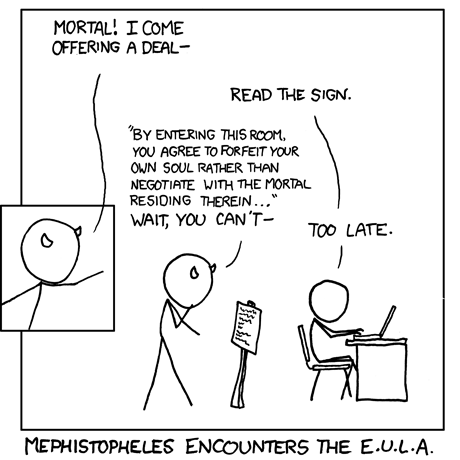In the IT newspaper Computer Sweden a Swedish IT/IP lawyer (Malin Forsman) is quoted as saying that proprietary software is of “better quality” than Free or Open Source software (my translation):
She recommends against Swedish software providers from going ‘open souce’. According to her using licensing costs is a much better method.
– You need a carrot to exert yourself properly. If the large source of income is dependent upon the quality of the code then I believe that you will try harder.
My first problem is with the journalism and the article itself. Like many other short newspaper articles it does not seem to have a point. What is the newsworthiness of this article? That an individual has an opinion? So what? We all have opinions but this does not make them newsworthy. Mind you if this had been my only complaint it would not have been worth blogging about.
My second problem is with journalistic integrity. By simply blogging the lawyer we arrive at the law firm where she works and her brief bio, where under Memberships we see that she is a member of: Board member of the IT group of the Stockholm Chamber of Commerce, Board Member of the Association for IT and Law, Member of the Swedish Copyright Association and Member of the International Technology Law Association. Her main legal experience outside law firms was working for Microsoft Corporation. Shouldn’t this maybe have been indicated in the article? If the journalist is presenting an opinion as news then shouldn’t some sort of critical analysis be added? I know that journalists are supposed to be objective but this article is hardly reporting the news as it is.
The next problem is with the lawyer herself. I have no doubt that she is a qualified lawyer and an expert in the IT/IP field but what is wrong with her statements? Unless of course this is simply a case of journalistic misquote she is a legal expert speaking of the quality of code. She does not attempt to define quality even if such a definition was at all possible. By her logic an Open Source project that makes it’s code proprietary immediately improves its code and a proprietary software project that releases its code under an Open Source license immediately deteriorates the quality of its code. Obviously these are ridiculous statements. But when the IT/IP legal expert says them we are supposed to nod our heads in agreement.
So who would be the right person to make such a statement? Well that person would need to have a vast experience of code not law. This imaginary person would need to have a vast experience of both open and proprietary projects and be able to define the concept of quality in a way that will enable these projects to be measurable and comparable. In addition to this the person would need to be free from suspicions of bias. I doubt whether such a super person exists.
But what may be said about quality? Here are two quotes:
Peter Drucker: (Innovation and entrepreneurship, 1985) “Quality in a product or service is not what the supplier puts in. It is what the customer gets out and is willing to pay for. “ISO 9000: “Degree to which a set of inherent characteristic fulfills requirements.”
Now lets complicate the issue even more:
While both these definitions are relatively common neither takes into full account the nature of software quality. The problem arises from the fact that software is a mix of product and service. The actual code is not what customers buy – they buy a function. Who cares what the software of a word processor looks like? It’s function is what the customer believes he/she has bought. If this is true then the customer has also bought an expectation of support in the case of software failure.
This was just meant as an illustration of the complexity of software quality and why neither a journalist nor a lawyer can deal with such a question in the space of a 350 word article. What they are really doing is pure advertising in the form of journalism. Advertising a personal, political and business stance on software while puffing up their own egos.


